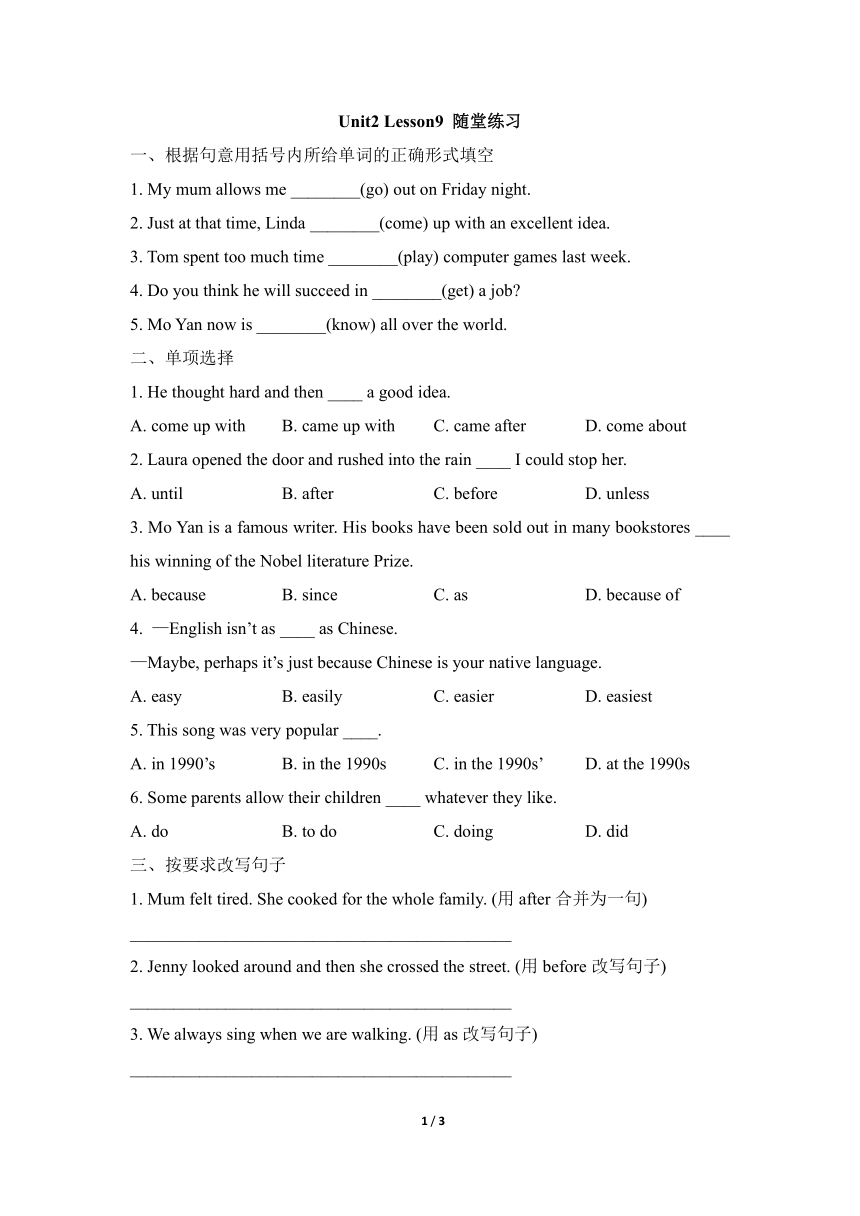
Unit2 Lesson9 随堂练习 一、根据句意用括号内所给单词的正确形式填空 1. My mum allows me _____(go) out on Friday night. 2. Just at that time, Linda _____(come) up with an excellent idea. 3. Tom spent too much time _____(play) computer games last week. 4. Do you think he will succeed in _____(get) a job 5. Mo Yan now is _____(know) all over the world. 二、单项选择 1. He thought hard and then ____ a good idea. A. come up with B. came up with C. came after D. come about 2. Laura opened the door and rushed into the rain ____ I could stop her. A. until B. after C. before D. unless 3. Mo Yan is a famous writer. His books have been sold out in many bookstores ____ his winning of the Nobel literature Prize. A. because B. since C. as D. because of 4. —English isn’t as ____ as Chinese. —Maybe, perhaps it’s just because Chinese is your native language. A. easy B. easily C. easier D. easiest 5. This song was very popular ____. A. in 1990’s B. in the 1990s C. in the 1990s’ D. at the 1990s 6. Some parents allow their children ____ whatever they like. A. do B. to do C. doing D. did 三、按要求改写句子 1. Mum felt tired. She cooked for the whole family. (用after合并为一句) _____ 2. Jenny looked around and then she crossed the street. (用before改写句子) _____ 3. We always sing when we are walking. (用as改写句子) _____ 4. I won’t go to bed. My mum comes back. (用before合并为一句) _____ 5. I will call you before I go home. (对划线部分提问) _____ 四、完成句子:根据所给汉语意思,用单词或短语完成下列英文句子 1. 他在闲暇时间没有事情做。 He has nothing to do _____. 2. 他们当中没有人能够想出一个好办法。 None of them can _____ a good idea. 3. 我对足球根本不感兴趣。 I’m not interested in football _____. 4. 如果你很有名,人们将一直关注你。 If you are famous, people will watch you _____. 5. 你长大后想做什么? What do you want to be when you _____ 参考答案及解析 一、 1. to go 2. came 3. playing 4. getting 5. known 二、 1. B come up with意为“想出”,为固定短语,且由前面的thought可知用一般过去时,故选B。 2. C 句意为:“我还没有来得及阻止她,劳拉就打开门,冲进了雨里。”until意为“直到”,通常用not…until…结构;after意为“在……之后”;before意为“在……之前”;unless意为“除非”;只有C项符合句意。 3. D 考查连词(词组)的用法。because of意为“由于”,后接名词或名词性短语,符合句意;而because意为“因为”,引导原因状语从句;since意为“自从;既然”;as意为“当……的时候”,均与句意不符。故选D。 4. A 考查形容词的用法。as...as…之间用形容词或副词的原级,排除C、D两项,在系动词be之后用形容词。故选A。 5. B 表示在“多少世纪多少年代”常用定冠词the,年代后要加s或’s。 6. B allow sb. to do sth.意为“允许某人做某事”。 三、 1. Mum felt tired after she cooked for the whole family. 2. Jenny looked around before she crossed the street. 3. We always sing as we walk. 4. I won’t go to bed before my mum comes back. 5. When will you call me 四、 1. in his spare/free time 2. come up with 3. at all 4. all the time 5. grow up 1 / 3 ... ...
~~ 您好,已阅读到文档的结尾了 ~~